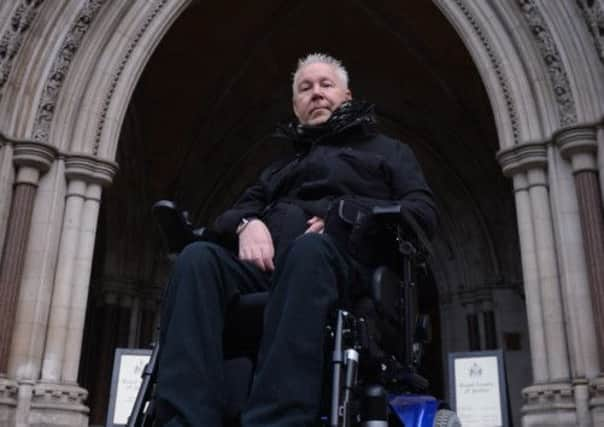Right to die blow will not halt legal battle


After three judges in London rejected their cases, former builder and father-of-two Paul Lamb, 57, of Bramley, Leeds, who wants a doctor to help him die in a dignified way, said he was “absolutely gutted” by the decision, but said he would carry on with the fight.
Mr Lamb had won the right to join the litigation to continue the battle started by Mr Nicklinson, from Wiltshire, said: “I was hoping for a humane and dignified end. This judgment does not give me that.
Advertisement
Hide AdAdvertisement
Hide Ad“I will carry on the legal fight - this is not just about me but about many, many other people who are being denied the right to die a humane and dignified death just because the law is too scared to grapple with these issues.”
Mr Nicklinson’s widow Jane said in a statement: “As a family, we are hugely disappointed with the judgment but it will not stop us.
“We will carry on with the case for as long as we can so that others who find themselves in a position similar to Tony don’t have to suffer as he did. Nobody deserves such cruelty.”
The next move is to continue their battle at the Supreme Court, the UK’s highest court.
Advertisement
Hide AdAdvertisement
Hide AdThe Lord Chief Justice, sitting with Master of the Rolls Lord Dyson and Lord Justice Elias, said in a lengthy written ruling that the law “relating to assisting suicide cannot be changed by judicial decision”.
He said: “Whatever the personal views of any individual judge on these delicate and sensitive subjects - and I suspect that the personal views of individual judges would be as contradictory as those held by any other group of people - the constitutional imperative is that, however subtle and impressive the arguments to the contrary may be, we cannot effect the changes or disapply the present statutory provisions, not because we are abdicating our responsibility, but precisely because we are fulfilling our proper constitutional role.”
The Court of Appeal dismissed the Nicklinson and Lamb challenges over the legal ban on voluntary euthanasia, but in a majority ruling allowed an appeal by a locked-in syndrome sufferer known as “Martin”, who had sought clarification of Director of Public Prosecution (DPP) guidance relating to the position of health professionals in assisted suicide cases.
During the appeal hearing in May, the judges heard argument that people who are too sick or disabled to end their “unbearable” lives without help are currently being condemned to “suffer in silence or make desperate attempts to kill themselves”.
Advertisement
Hide AdAdvertisement
Hide AdFather-of-two Mr Nicklinson, 58, died at home in Melksham, Wiltshire, last August, a week after he lost a High Court bid to end his life with a doctor’s help.
Mr Nicklinson, who was paralysed by a stroke while on a business trip to Athens in 2005, had refused food and contracted pneumonia after he was “devastated” by the decision of Lord Justice Toulson, Mr Justice Royce and Mrs Justice Macur.
Paul Bowen QC, representing Mrs Nicklinson and Mr Lamb, told the appeal judges that for those who have “made a competent choice to end their lives, but who cannot physically act upon that choice without medical assistance, such as Tony Nicklinson before he died and Paul Lamb, the law of murder and assisted suicide constitute, for practical purposes, an insurmountable obstacle”.
Mr Lamb is immobile except for limited movement in his right hand and has been in significant pain since 1990. He says he feels worn out and fed up of going through the motions of life rather than living it.
Advertisement
Hide AdAdvertisement
Hide AdMr Lamb wants a doctor to help him die in a dignified way, preferably by a lethal injection, with his family around him in his own home but this third party assistance is considered to be murder under common law.